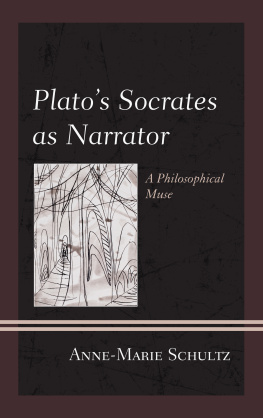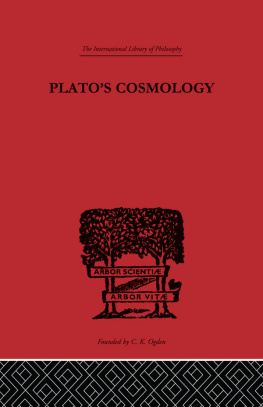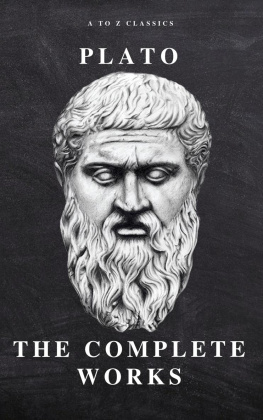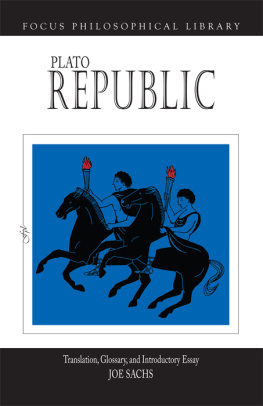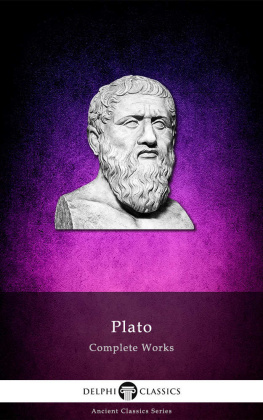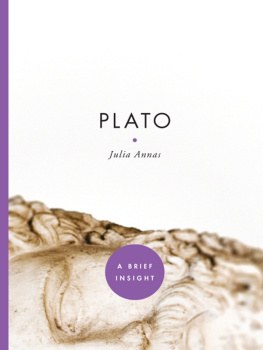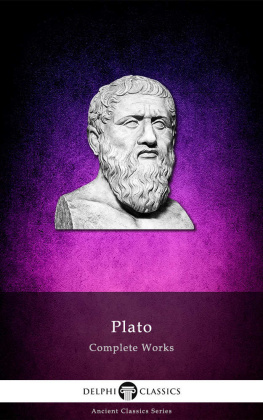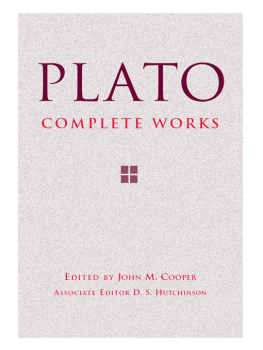Plato. - Selected Myths
Here you can read online Plato. - Selected Myths full text of the book (entire story) in english for free. Download pdf and epub, get meaning, cover and reviews about this ebook. City: UK;New York, year: 2004, publisher: Oxford University Press, genre: Religion. Description of the work, (preface) as well as reviews are available. Best literature library LitArk.com created for fans of good reading and offers a wide selection of genres:
Romance novel
Science fiction
Adventure
Detective
Science
History
Home and family
Prose
Art
Politics
Computer
Non-fiction
Religion
Business
Children
Humor
Choose a favorite category and find really read worthwhile books. Enjoy immersion in the world of imagination, feel the emotions of the characters or learn something new for yourself, make an fascinating discovery.

- Book:Selected Myths
- Author:
- Publisher:Oxford University Press
- Genre:
- Year:2004
- City:UK;New York
- Rating:5 / 5
- Favourites:Add to favourites
- Your mark:
- 100
- 1
- 2
- 3
- 4
- 5
Selected Myths: summary, description and annotation
We offer to read an annotation, description, summary or preface (depends on what the author of the book "Selected Myths" wrote himself). If you haven't found the necessary information about the book — write in the comments, we will try to find it.
Selected Myths — read online for free the complete book (whole text) full work
Below is the text of the book, divided by pages. System saving the place of the last page read, allows you to conveniently read the book "Selected Myths" online for free, without having to search again every time where you left off. Put a bookmark, and you can go to the page where you finished reading at any time.
Font size:
Interval:
Bookmark:
OXFORD WORLDS CLASSICS
SELECTED MYTHS
PLATO (c. 427347 BCE), Athenian philosopher-dramatist, has had a profound and lasting influence upon Western intellectual tradition. Born into a wealthy and prominent family, he grew up during the conflict between Athens and the Peloponnesian states which engulfed the Greek world from 431 to 404 BCE. Following its turbulent aftermath, he was deeply affected by the condemnation and execution of his revered master Socrates (469399) on charges of irreligion and corrupting the young. In revulsion from political activity, Plato devoted his life to the pursuit of philosophy and to composing memoirs of Socratic enquiry cast in dialogue form. He was strongly influenced by the Pythagorean thinkers of southern Italy and Sicily, which he is said to have visited when he was about 40. Some time after returning to Athens, he founded the Academy, an early ancestor of the modern university, devoted to philosophical and mathematical enquiry, and to the education of future rulers or philosopher-kings. The Academys most celebrated member was the young Aristotle (384322), who studied there for the last twenty years of Platos life. Their works mark the highest peak of philosophical achievement in antiquity, and both continue to rank among the greatest philosophers of all time.
Plato is the earliest Western philosopher from whose output complete works have been preserved. At least twenty-five of his dialogues are extant, ranging from fewer than twenty to more than three hundred pages in length. For their combination of dramatic realism, poetic beauty, intellectual vitality, and emotional power they are unique in Western literature.
CATALIN PARTENIE is a Fellow of the University of Quebec at Montreal. He has also taught at Concordia University in Montreal and held visiting research positions at the Netherlands Institute for Advanced Studies, the Hastings Center in New York, and the British School of Classical Studies at Athens, where he was an Onassis Fellow. He has translated into Romanian Platos Timaeus (in collaboration), Critias, and Menexenus, and is co-editor of Platos Complete Works in Romanian (Humanitas). He has also co-edited (with Tom Rockmore) Heidegger and Plato (Northwestern University Press).
OXFORD WORLDS CLASSICS
For over 100 years Oxford Worlds Classics have brought readers closer to the worlds great literature. Now with over 700 titlesfrom the 4,000-year-old myths of Mesopotamia to the twentieth centurys greatest novelsthe series makes available lesser-known as well as celebrated writing.
The pocket-sized hardbacks of the early years contained introductions by Virginia Woolf, T. S. Eliot, Graham Greene, and other literary figures which enriched the experience of reading. Today the series is recognized for its fine scholarship and reliability in texts that span world literature, drama and poetry, religion, philosophy, and politics. Each edition includes perceptive commentary and essential background information to meet the changing needs of readers.
Refer to the to navigate through the material in this Oxford Worlds Classics ebook. Use the asterisks (*) throughout the text to access the hyperlinked Explanatory Notes.
OXFORD WORLDS CLASSICS

PLATO

Edited by
CATALIN PARTENIE


Great Clarendon Street, Oxford OX2 6DP
Oxford University Press is a department of the University of Oxford.
It furthers the Universitys objective of excellence in research, scholarship,
and education by publishing worldwide in
Oxford New York
Auckland Bangkok Buenos Aires Cape Town Chennai
Dar es Salaam Delhi Hong Kong Istanbul Karachi Kolkata
Kuala Lumpur Madrid Melbourne Mexico City Mumbai Nairobi
So Paulo Shanghai Taipei Tokyo Toronto
Oxford is a registered trade mark of Oxford University Press
in the UK and in certain other countries
Published in the United States
by Oxford University Press Inc., New York
Translations Robin Waterfield (Republic 1993, Gorgias 1994,
Symposium 1994, Phaedrus 2002, Timaeus 2004, Critias 2004);
C. C. W. Taylor (Protagoras 1996); David Gallop (Phaedo 1993)
Editorial matter Catalin Partenie 2004
The moral rights of the author have been asserted
Database right Oxford University Press (maker)
First published as an Oxford Worlds Classics paperback 2004
All rights reserved. No part of this publication may be reproduced, stored in a retrieval system, or transmitted, in any form or by any means, without the prior permission in writing of Oxford University Press, or as expressly permitted by law, or under terms agreed with the appropriate reprographics rights organizations. Enquiries concerning reproduction outside the scope of the above should be sent to the Rights Department, Oxford University Press, at the address above
You must not circulate this book in any other binding or cover
and you must impose this same condition on any acquirer
British Library Cataloguing in Publication Data
Data available
ISBN 0192805088
1 3 5 7 9 10 8 6 4 2
Typeset in Ehrhardt
by RefineCatch Limited, Bungay, Suffolk
Printed in Great Britain by
Clays Ltd., St. Ives plc
For Ioana and Luca
This volume brings together ten of the most celebrated Platonic myths. They belong to eight of Platos dialogues, ranging from the early Protagoras and Gorgias to the late Timaeus and Critias. The myths appear here in the most probable chronological order of their composition. Although some of them contain deities and adapted themes of traditional Greek mythologysuch as Phaethon, Zeus, the judgement after death, or the Isles of the Blessedthey may all be regarded as Platos own inventions.
These ten myths are self-contained stories. They have journeyed through more than two thousand years like ten strange pilgrims (to borrow the English title of one of Garca Mrquezs collections of short stories), each one being always ready to seduce the reader into its enigmatic realm. They were not supposed to be assembled in a greater, coherent whole, but they bear upon many Platonic philosophical questions, and, taken as a whole, they form an unusual introduction to Platos philosophy. The reader is invited both to contemplate their imagery and to meditate on the philosophical questions they hide in this very imagery.
Hegel claimed that the real value of Plato does not rest in his myths.to unfetter himself, and he realizes that what he believed to be real beings are mere shadows. Then a mysterious man guides him out of the cave, and the former prisoner sees that the real light is outside the cave, and that its origin is the sun. And the sun, Plato says, is an analogy for the ultimate principle of the entire existence, which he called in a previous section of Republic the good (for more on this see the prefatory note that accompanies The Cave). The myth, however, is said to be an analogy for education. Indeed, education, Plato claims, is not inserting vision into blind eyes. Rather, it is turning ones eyes from darkness to light, which involves a transformation of ones perspective on things.
Next pageFont size:
Interval:
Bookmark:
Similar books «Selected Myths»
Look at similar books to Selected Myths. We have selected literature similar in name and meaning in the hope of providing readers with more options to find new, interesting, not yet read works.
Discussion, reviews of the book Selected Myths and just readers' own opinions. Leave your comments, write what you think about the work, its meaning or the main characters. Specify what exactly you liked and what you didn't like, and why you think so.


